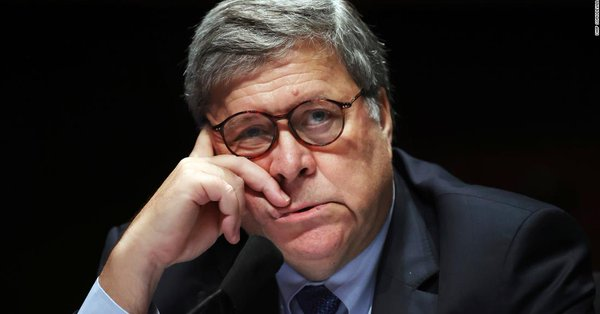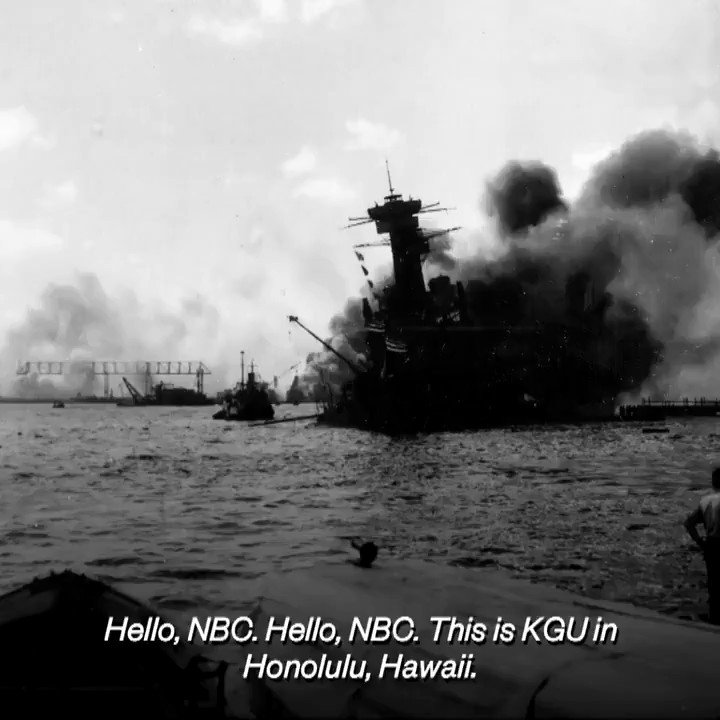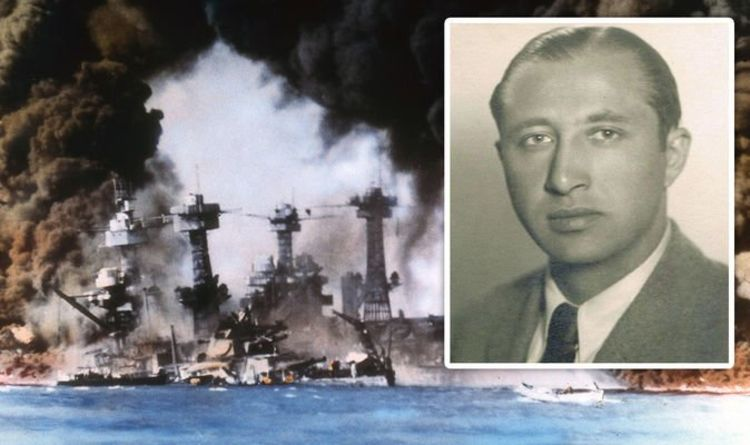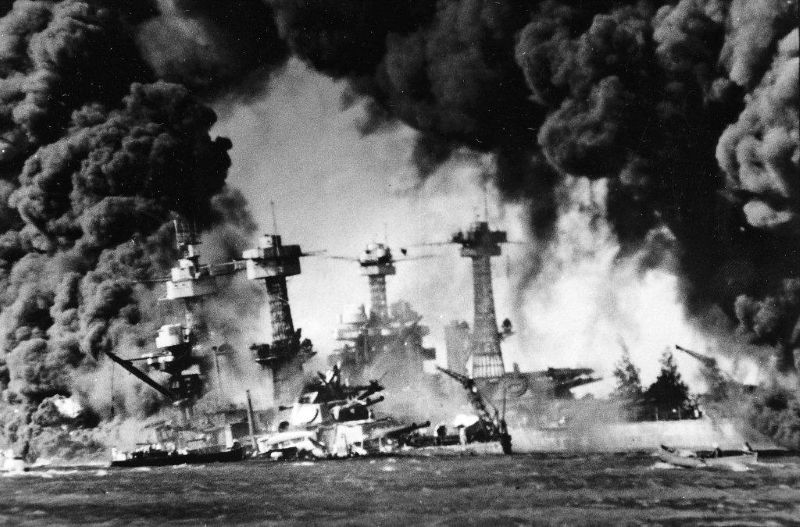Pearl Harbor and the FBI - 10:01 AM December 7, 2020 – Meet Dusko Popov: A Nazi-American Double Agent. Could he have warned Washington about Pearl Harbor? By Warfare History Network
-"Hello, NBC ... It is no joke. It is a real war."
— NBC News (@NBCNews) December 7, 2020
Listen to the live radio breaking news broadcast to NBC during the attack on Pearl Harbor on Dec. 7, 1941 — 79 years ago today. pic.twitter.com/LIkdSO1Jiz
-Meet Dusko Popov: A Nazi-American Double Agent https://t.co/LHouLvEWWt
— Michael Novakhov (@mikenov) December 7, 2020
_______________________________________________________
Pearl Harbor and the FBI - 10:01 AM December 7, 2020 – Meet Dusko Popov: A Nazi-American Double Agent. Could he have warned Washington about Pearl Harbor? By Warfare History Network

Meet Dusko Popov: A Nazi-American Double Agent
Could he have warned Washington about Pearl Harbor?
by Warfare History Network
On March 18, 1941, an accident took place in the crowded streets of New York’s Times Square. Normally an accident like this would not make news. After all, such things happened frequently. This incident, however, was different.
The victim, while lying on the ground, was then run over by a second vehicle, which sped away. The man died the next day in a New York hospital. In his possession was a Spanish passport in the name of Don Julio Lopez Lido. New York police officers traced the man to the Taft Hotel in New York City. Upon searching his room, they were shocked to find secret documents, including a report on the defenses of the U.S. Army base at Pearl Harbor, Hawaii, and nearby Hickam Field. This information was then turned over to the FBI. After a thorough investigation, Don Julio Lopez Lido was identified as Ulrich von der Osten, a top member of Germany’s military intelligence service, the Abwehr, who had been sent to the United States to set up a spy ring.
Unknown to the FBI was that the death of Ulrich von der Osten would lead to another spy case involving Great Britain, the United States, and Germany. It would also involve two of the most influential spymasters in the United States, William Donovan, who would later become director of the Office of Strategic Services (OSS), which was the forerunner of the Central Intelligence Agency (CIA), and J. Edgar Hoover, director of the FBI, as well as the super-secret British XX Committee (or Double Cross System). An added feature of this budding case involved Japanese interest in the defenses of Pearl Harbor, nine months before the attack on December 7, 1941.
The man at the center of this international spy game was Dusko Popov, a flamboyant Yugoslav, who was born in 1912. At the start of World War II, Popov began working for the Abwehr, headed by Admiral Wilhelm Canaris. Popov had been recruited into the Abwehr by a German friend, Johann Jebsen. His first assignment was to go to France and report on any political leaders who might be helpful to the Nazis.
Popov gave the required information to the Abwehr. As time went on, Popov became deeply disturbed by the way Hitler was carving up Europe, as well as the way he was dealing with dissent inside Germany. Making a decision that would alter the rest of his life, Popov decided to offer his services to the British and become a double agent, if they would have him.
After a detailed debriefing session by MI-5 it was ascertained that Popov was truly what he said he was, and the British Secret Service made plans for their new recruit. He was given the code name Tricycle, due to the fact that Popov was often engaged in sexual activity with two women at a time.
Popov was ensconced in a room at the Savoy Hotel in London where his initial training was conducted. One of his early British handlers was a certain Major T.A. Robertson, who was a frequent social companion of Popov. They often went dining at posh London restaurants, played billiards, and met various women during their nightly sojourns. After one nocturnal trip during the Christmas season in 1940, Major Robertson wrote of their escapades, “I think he [Tricycle] enjoyed himself thoroughly once he took part in the Christmas champagne. We were picked up by a couple by the name of Keswick who took us to the Suivi nightclub where we danced. Early in the morning we returned to the Savoy, both viewing things through rose-tinted spectacles.“
Bogus Information Concerning the Number of Supermarine Spitfire and Hawker Hurricane Squadrons Were Secretly Sent to Berlin
The British initiated an elaborate plan to pass Popov off as a genuine Nazi agent, while all the time he was under the constant direction of the British Secret Service. Popov was run by the so- called Double Cross System, a department of British intelligence, which was responsible for the running (and turning) of all captured German spies who were caught trying to burrow their way into British society.
The unsuspecting Germans gave Popov a file stamped “most secret” in which they wanted him to provide them with the state of the British arms industry, including which types of military equipment were being manufactured at facilities in the towns of Weybridge, Wolverhampton, and Dartford. The Germans also wanted to know how many squadrons of Supermarine Spitfires and Hawker Hurricanes were operational in the Royal Air Force. Bogus information concerning these queries was secretly sent back to Berlin.
With the untimely death of Ulrich van der Osten in New York in March 1941, the Abwehr decided that Popov should be sent to the United States to fill the important vacancy. That decision by the leadership of the Abwehr was a boon for Popov and an intelligence disaster for the Germans.
Popov left for the United States in early August 1941. He carried with him $58,000 provided by the Abwehr to set up his New York espionage network. First, he had to make a small side trip to the posh casinos in Estoril. As the dashing Popov gambled at the roulette tables and made a killing using his Nazi-provided funds, a man stood only a few feet from him, watching his every move. That man proved to be Commander Ian Fleming of the British Naval Intelligence Service, who had been dispatched by MI-6 to watch Popov’s every move. When Fleming created his famous fictional spy, James Bond, Agent 007, it is widely believed that he used Popov as his basis for the character. He also included a scene very much like that of Popov at the Estoril casino in his book Casino Royale.
Popov arrived in the United States on August 12, 1941, disembarking at LaGuardia Airport from the Pan Am Clipper. After checking through immigration, he took a cab to the posh Waldorf Astoria Hotel, overlooking Park Avenue in New York City.
Just before he left for the United States, the dashing 29-year-old Popov had been given a vital, new piece of spy paraphernalia by the Abwehr. It was a list of questions written on a microdot that would allow pages of information to be reduced to the size of a pinhead. The microdot was affixed to a telegram, which Popov kept on his person.
Once in New York, Popov contacted the FBI and asked that someone come to meet with him. To his disappointment, he had to wait five long days until the Bureau responded. He was finally met by Agent James Foxworth, who was the FBI’s bureau chief in New York. Popov handed over the microdot. As Agent Foxworth began to read its contents, he knew he had something important. The paper contained a list of questions that the Germans wanted answered for their allies, the Japanese. Among the queries were information on American defenses at the giant naval base at Pearl Harbor, Hawaii, including the exact locations of the airbases at Hickam, Wheeler, and Kaneohe airfields, sketches of Pearl Harbor, the depths of the water inside the harbor, and the number and locations of any antitorpedo nets.
Hoover Did Not Trust Popov, a Flagrant Womanizer, Believing Him to Still be Working for the Germans
If FBI personnel had been paying any attention, they would have noticed that the material carried by Popov was the same as that found in the room of German agent Ulrich van der Osten only five months before.
Foxworth gave Popov’s questionnaire to Hoover, who did not trust Popov, believing that he was still working for the Germans. Another strike against Popov was his playboy lifestyle. He was a flagrant womanizer who had engaged in numerous affairs, including one with French actress Simone Simon and her mother. He had also spent the Abwehr’s money lavishly.
Popov’s every move was watched closely by the FBI, and what the Bureau’s agents noticed was that after three months of living the high life in New York, Popov had not contacted any German agents in the city. The Abwehr, too, was beginning to have second thoughts about its prize agent, becoming suspicious that he might have been “turned.”
Popov transferred the Pearl Harbor intelligence to the FBI under orders from the British MI-6. His case was personally supervised by Stewart Menzies, head of MI-6, who contacted Hoover and “loaned” Popov to the Americans.
Popov now would become a pawn in the looming intelligence battle between FBI Director Hoover and his nemesis, William Donovan who had recently been appointed head of the COI (Coordinator of Information), America’s newest intelligence organization with responsibility for all overseas espionage work.
Donovan was a World War I hero, a Republican lawyer in New York, and a classmate of FDR’s at Columbia University’s school of law. He traveled extensively to Europe and the Middle East on behalf of the U.S. government during the interwar years and collected much valuable intelligence on the people he met and the places he visited. He was also Roosevelt’s personal emissary to Great Britain immediately following that nation’s declaration of war against Germany. With Donovan’s appointment as head of COI, he would begin a decades-long feud with J. Edgar Hoover over the direction of American intelligence.
The concept of COI did not sit well with Hoover, who took an instant dislike to Donovan’s new agency and made his feelings quite clear to the president. Roosevelt, not wanting to offend Hoover too deeply, allowed the FBI to continue its primary intelligence gathering responsibility in South America.
After the United States entered World War II, the British began to share sensitive intelligence with COI, including the breaking of German military and diplomatic codes, which led to the rounding up of all German double agents inside England.
Hoover distrusted the British and their secret relationship with Donovan, and the fact that they were “loaning” Popov to the United States rankled him greatly. When Hoover received Popov’s Pearl Harbor questionnaire, he did a curious thing. Instead of handing it over to Bill Donovan, or more importantly, to FDR, Hoover doctored the questions, gave nothing to Donovan, and omitted the Pearl Harbor queries when he finally sent the questionnaire to the White House.
In late November 1941, under the ever watchful eye of the FBI, Popov received orders from the Abwehr, sending him to Rio de Janeiro, Brazil. He was contacted by the Abwehr man in Rio and was told to establish a radio link between Rio and Lisbon. Popov was to concentrate on seeking information on war production, the destinations of Allied convoys, and any news he could provide on anti-submarine warfare.
Questions Concerning Popov and His Career as Tricycle Persist to This Day.
Since the FBI had been given the responsibility of running U.S. agents in Latin and South America, the Bureau knew all about Popov’s adventures and kept one step ahead of him.
Popov was in Rio on December 7, 1941, when the Japanese attacked Pearl Harbor. He returned to the United States one week later and handed over a second set of microdots to the FBI. A sampling of his second set of questions from the Abwehr concerned the types of powder used for ammunition and seven pages concerning U.S. atomic bomb research.
Popov was furious with the way he had been treated by the FBI and wondered why the Americans had not take his warning of Japanese interest in the Pearl Harbor defenses more seriously. In hindsight, the British were of the opinion that it was the Americans who had to verify Popov’s information, despite the fact that they had vouched for his credibility throughout his stay in the United States. Popov was also disappointed when the FBI refused to allow him access to long-range radio equipment, preventing him from sending information, both real and bogus, to his many contacts in Europe.
To cut any further losses concerning Popov, the British decided he should be returned to London as soon as possible. But that would be difficult to accomplish without blowing his cover with the Germans and possibly getting him killed. Popov left New York and arrived in Lisbon, where he was met by his Abwehr controller, Ludovico von Karsthoff. Popov brought with him a gift for von Karsthoff’s girlfriend, which broke the ice upon his arrival. Popov took a big chance and berated von Karsthoff for not providing him with the necessary funds he needed to set up his espionage network in the U.S. and brazenly told him that he was resigning from any further work for the Abwehr.
Popov returned to Britain in 1943 and worked for the XX Committee for the rest of the war. One of his major contributions to the Allied war effort was information he passed to Karsthoff detailing the strength and organization of the fictitious First U.S. Army Group (FUSAG). While Karsthoff doubted the integrity of the information, those who received it in Berlin did not. Their acceptance of Popov’s disinformation helped to preserve the illusion of Allied intentions prior to the Normandy invasion of June 6, 1944.
Questions concerning Popov and his career as Tricycle persist to this day. One stems from his claim that the Abwehr ordered him to go to Hawaii to learn as much as he could about the military installations on the island of Oahu. Most military historians believe that there is no credible evidence that the Germans ever issued orders for any travel by Popov to Hawaii.
Another unanswered question in the Popov case is whether or not he actually met with J. Edgar Hoover at all during his time in the United States. FBI documents shed no convincing light on this matter, and people on each side have differing opinions. In his memoirs, Popov said that he “encountered J. Edgar Hoover at the FBI office in New York.” After Hoover’s death, the FBI stated flatly that no such face-to-face meeting had occurred.
In later years, Popov wrote his memoirs, Spy/Counterspy. He died in 1981 at the age of 69, leaving behind a wife and three sons.
Author: New Jersey resident Peter Kross is the author of The Encyclopedia of World War II Spies.
Ludwig Spy Ring
Kurt Frederick Ludwig
The capture of German spy Teodore Erdmann Erich Lau on October 18, 1946—the last of the infamous German espionage “Ludwig ring”—was put in motion five years earlier by a jaywalker in New York City.
“Senor Don Julio Lopez Lido,” ostensibly a courier for Spain, was crossing against a traffic light one spring evening in 1941 when a taxi struck him—fatally throwing him under the wheels of another car. His companion, who had tried to stop the accident, instantly grabbed Lido’s attaché case and left the scene.
New York police took note of the companion’s suspicious actions, but even more were puzzled by dead man’s possessions: his papers were in German, not Spanish; his notebook contained names and possible assignments of some U.S. soldiers; his clothes had no labels. They turned these items over to the FBI. The Bureau, though, could not identify the mysterious companion of the false Lido.
Another case at the time puzzled them too: secret messages from a mysterious “Joe K”—forwarded by British censors in Bermuda—described vital American defense information. Neither the Brits nor the Bureau had been able to identify the spy. Then the Bureau itself intercepted a message from “Joe K” that used secret writing to tell his superiors of “Senor Lido’” fatality. A connection was made, and the hunt was on.
“Joe K’ turned out to be none other than U.S.-born Kurt Frederick Ludwig. Ludwig had moved back to his parents’ native land as a young man, and German intelligence was delighted to recruit him as an agent in the war effort. It had sent him back to the U.S. in March 1940 to set up a spy ring of young, industrious agents who could gather information about U.S. troops, U.S. order of battle, and U.S. manufacturing.
“Senor Lido” turned out to be Captain Ulrich von der Osten of the German Abwher, and—the final piece of the puzzle—his companion was none other than Joe K/Kurt Frederick Ludwig. Tracking Ludwig around the country, FBI agents were able to identify Ludwig’s spies and contacts. Arrests followed, and in March 1943, eight members of the Ludwig ring were tried and sentenced to long jail terms.
The case, though, was not over. One agent—codenamed “Bill”—had eluded capture, and the FBI continued to follow new leads in the case. One led to Teodore Erdmann Erich Lau, a German-born Argentinean who had served as paymaster for the Ludwig ring in 1941 and 1942. The Bureau tracked “Bill” through South America, England, and Canada, until agents finally captured him in New York on October 18, 1946. In short order, Lau was tried and sent to prison like the rest of Ludwig’s ring.
Google Searches:
Abwehr and the Japanese attack on Pearl Harbor




































Comments
Post a Comment